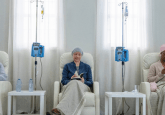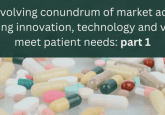Navigating uncertainty: redefining healthcare value in an evolving healthcare landscape

Since the establishment of the UK’s National Institute for Clinical Excellence (NICE) in 1999, which aimed to evaluate the clinical and cost effectiveness of new healthcare innovations, life science companies have been required to participate in various health technology and value assessments. However, the landscape of value assessment is undergoing significant change, particularly with the introduction of Joint Clinical Assessments (JCA) in Europe and the Inflation Reduction Act (IRA) in the United States. These policy shifts, driven by factors such as resource scarcity, the increasing number of healthcare innovations, and patient demand for access to these advancements, create a complex landscape that life science companies must adeptly navigate.
At ISPOR 2024, the presentation entitled, “No Longer Business as Usual: Establishing Value in an Uncertain and Dynamic Landscape,” delved into the pressing need for life science companies to evolve their value demonstration methodologies to keep pace with the rapidly changing global health policy landscape. Sponsored by consulting firm Avalere, part of Avalere Health, the session was moderated by Laura Housman, who was joined by her colleagues Michael Ciarametaro and Jan McKendrick to discuss the challenges that companies face and strategies to overcome them. In this Deep Dive, we summarize the key points from the session and outline actions needed to equip stakeholders with the insights required to navigate this uncertain landscape.

Impact of external requirements and evolving internal constraints on evidence generation and value demonstration
The conversation kicked off with Laura Housman engaging the panel regarding the requirements and opportunities for incorporating evidence generation in a dynamic way across life sciences. Michael Ciarametaro explained the need for life science companies to meet the diverse and shifting demands for value demonstration in the US. The evolving healthcare environment in the US is driven by growing affordability concerns and a cultural resistance to centralized decision-making and quantifying the value of life, exemplified through recent discussions around the role and use of quality-adjusted life years (QALYs). Historically, this has led to various stakeholders needing to demonstrate value independently without a unified system. Several policies in the US, including the IRA-mandated Medicare Drug Price Negotiations and reforms to the Medicare Part D program, the introduction of Prescription Drug Affordability Boards (PDABs) and pharmacy and therapeutics (P&T) committee reviews reflect this fragmented approach. The evidence requirements for each differ, with the Institute for Clinical and Economic Review (ICER) and payers historically seeking more traditional clinical and health economic evidence, while PDABs, although a recent policy, look for evidence assessing drug pricing. The lack of a centralized system and evolving criteria for demonstrating value mean that life science companies must navigate multiple, varying requirements that are subject to change over time.
“There is no one set of requirements for life science companies to meet. They’re different in nature but they’re also equally important. And they’re also evolving. It’s not a static thing. You need to be cognizant of the fact that this is likely to change over the coming years.” Michael Ciarametaro, Avalere, ISPOR 2024
You may also be interested in this recent Webinar from Avalere:
Valuing the Patient Perspective: Patient-Centered HTA
The expert panel addressed the challenge of integrating patient perspectives into value assessments, discussing implications for evidence strategy, health equity, caregiver involvement, and downstream impacts on care delivery.
Moving onto the European perspective, Jan McKendrick discussed the impact of the JCA from a European perspective, emphasizing that despite the ambition that JCA would provide some degree of unification of evidence through a consolidated set of population, intervention, comparator, and outcomes (PICOs), country-specific requirements currently remain unchanged. While JCA aims to streamline thinking around assessment of clinical benefit, national market needs persist, and the potential for heterogeneity in evolving PICOs across markets sharpen this focus. She highlighted that the central JCA assessment could open opportunities for patient access in some countries through navigation of the PICOs, but understanding the specific PICOs for any market and balancing them with JCA requirements is crucial for success.
“Although JCA gives you the core, it certainly doesn’t give you the whole. People will continue to see how things evolve over time with requirements for JCA and reassessments in the individual markets. There’s still a lot to watch. We’ve not even had one JCA through the assessment process yet. The year 2025 is going to be interesting.” Jan McKendrick, Avalere Health, ISPOR 2024
McKendrick reiterated the nuanced approach needed by life science companies in individual markets, highlighting that a one-size-fits-all strategy is inadequate. Whilst JCA PICOs are established during the same time period as licensing takes place, earlier anticipation of these is required in the development process to ensure that evidence to support value will be aligned with these PICOs. McKendrick noted the challenges faced by local market access teams who would be able to provide these insights about local PICOs, but who typically focus on upcoming launches rather than those five years ahead; so proactive planning and adaptability will be needed to ensure cohesive execution.
“You’ve got to plan early; you’ve got to scenario plan and figure out what is the value you’re leaving on the table at a local market level.” Jan McKendrick, Avalere Health, ISPOR 2024
Importance of early preparation for navigating new policies
Michael Ciarametaro noted that although there was slow momentum in recent years due to skepticism about policy implementation and potential legal obstacles, significant changes are now underway. At ISPOR, value assessment has long been a topic of discussion, but in the past two years, there has been a tangible shift towards actual market implementation. He stressed the potential consequences associated with evolving policies, emphasizing their financial repercussions for companies ill-prepared to address them.
“The risk is no longer really an academic exercise. The risks are very real. These policies have teeth and if you’re not adequately prepared for them, there will be financial consequences.” Michael Ciarametaro, Avalere, ISPOR 2024
The IRA, as an example, will not only accelerate price pressures early in a product’s lifecycle but also shorten that lifecycle. Traditionally, the value-benefit risk in terms of better coverage has not been to demonstrate superior efficacy to competitors. However, a shift is anticipated in the US environment, where lacking sufficient value and evidence to support a product’s value proposition will increasingly result in substantial downside risk. While this transformation may not occur abruptly, the next five years are expected to see a significant shift toward prioritizing robust evidence, with those more-prepared companies seeing the tangible benefits of their efforts. As Ciarametaro noted, “if you’re not coming to the table prepared with your evidence, you’re going to come out losing in the long run.”
Incorporating the patient voice
Jan McKendrick acknowledged the lack of formal inclusion of the patient voice in the JCA process, despite engagement with a variety of other stakeholders. While multiple stakeholders are involved, the patient remains the ultimate focus of those who should benefit from the JCA process. Life science companies need to strategize early on how to effectively gather and prioritize information that can genuinely benefit patients and differentiate from the evidence needed for other stakeholders involved in the process.
Ciarametaro echoed the importance of adopting a patient-centric approach as a key differentiator for companies. He acknowledged the FDA’s efforts in advancing patient-centered care and the Centers for Medicare & Medicaid Services’ interest in improving the patient listening sessions planned for the second cycle of the Medicare Drug Price Negotiation Program. Early demonstration of value from a patient perspective, supported by data and outcomes, is crucial. Integrating patient-centered outcomes and the patient perspective from the outset into clinical trial design and throughout development can provide a strong foundation that extends into real-world evidence (RWE) post-launch, positioning companies more effectively in the market.
Alignment within organizations to meet the demands of emerging policies
Jan McKendrick reiterated the ongoing challenge for life science companies who will engage in the JCA process, emphasizing the importance of recognizing the distinct evidence requirements for each country and effectively consolidating them in some way. Without proper scenario planning, companies risk encountering an overwhelming number of PICOs that were not anticipated, with the expectation that evidence can and should be developed to align with those PICOs. McKendrick, speaking from a statistical standpoint, stressed that given the impracticality of designing trials with sufficient stratification factors for all subgroups, strategic decision-making becomes essential with the need to anticipate various scenarios, determine arguments, utilize diverse data sources, and integrate different types of evidence early in the planning process. Ultimately, the goal is to ensure the industry maintains a robust evidence package that is both clinically and statistically sound. In the US, there’s a greater breadth of connected RWD sources compared to Europe. McKendrick proposed that alternative RWE methodologies, like Delphi panels, will be necessary to gather the evidence needed to address the varying PICO requirements across different countries.
Michael Ciarametaro acknowledged the need for life science companies to move toward a more integrated approach from the outset of product development.
“The key to success in this new world is to have a much more integrated view earlier when developing your products and to plan for understanding what the potential tradeoffs are and how to execute them.” Michael Ciarametaro, Avalere, ISPOR 2024
Leveraging evidence to maximize market access success
To address the requirements of JCA, the IRA, and individual market assessments effectively, Jan McKendrick explained that companies will need to develop robust data packages. Ensuring consistency in messaging across a range of stakeholders will require a holistic understanding of evidence needs across different assessments. The key challenge will lie in effectively utilizing various types of evidence for diverse purposes, and companies will need to enhance their ability to leverage a range of data sources whilst also addressing concerns related to the transferability and generalizability of this data across different contexts. RWE strategies – not just pre-launch but across the life cycle – will be essential as payers look at the portfolio of drugs being assessed and how they bring value to the population.
Michael Ciarametaro offered an alternative perspective, suggesting that companies should look at the global view, particularly in understanding the evidence and value needs in different regions; for example, launching in Europe for a specific indication may offer broader population opportunities compared to the US, challenging traditional market access practices. Ciarametaro stressed the need to understand the value requirements and leverage value strategies to optimize investment choices.
In summing up, Laura Housman reiterated:
“It’s never too early to start, and once you get started it’s an opportunity to be creative and thoughtful about the ways that you’re bringing that evidence together.” Laura Housman, Avalere, ISPOR 2024

WEBINAR: Valuing the Patient Perspective - Patient-Centered HTA
About the speakers
 Laura Housman, DrPHc (ABD), MBA, MPH, Senior Vice President and Practice Director of Evidence and Strategy, Avalere
Laura Housman, DrPHc (ABD), MBA, MPH, Senior Vice President and Practice Director of Evidence and Strategy, Avalere
Laura Housman, DrPHc (ABD), MBA, MPH is Senior Vice President and Practice Director of Evidence and Strategy within Avalere, bringing broad and extensive expertise in strategy, evidence generation, reimbursement, patient engagement, population health and personalized medicine to drive access to innovation across healthcare. In 2015 Laura founded and led Access Solutions Consulting (ASC), a healthcare advisory firm serving an extensive network of pharmaceutical, medical device, and diagnostic companies. Laura has launched and/or commercialized over 30 diagnostic offerings, successfully obtaining coverage and premium pricing from Medicare Administrative Carriers, including the MolDx program; national, regional and Blue Cross Blue Shield commercial plans nationwide; as well as in global markets.
Before joining Avalere, Laura served as Chief Commercial and Operations Officer of Olaris, a diagnostic company using metabolomics and machine learning to develop in vitro diagnostics. Prior to joining Olaris, Laura was Vice President/Head of Access, Outcomes and Population Health with Exact Sciences where she developed a function and led a multidisciplinary team focused on novel approaches for developing real-world evidence, population health initiatives and driving market access for Cologuard® and Exact’s broad range of diagnostic assays, including OncotypeDx™. Previously, Laura led the Market Access, Pricing and HE&OR group within Novartis’ Pharmaceutical Corporation’s global Pharma/Molecular Diagnostics unit; was Executive Director of Marketing for Charles River Laboratories, focused on the commercialization of its worldwide Preclinical, First in Human and Biopharmaceutical Services; and, led marketing and commercialization strategies in support of managed care outreach as Director of Marketing for Genzyme Genetics, a business unit of Genzyme Corporation. In addition to her work within industry, Ms. Housman spent a decade leading health services evaluation, contracting, and provider profiling initiatives as a Director within not-for-profit healthcare insurance plan BlueCross BlueShield of Massachusetts. Laura received her Bachelor of Arts degree in Economics from the College of Arts and Sciences and a Minor in Business Administration from the School of Management at Boston University; her Master of Public Health from the Boston University School of Public Health; and her Master of Business Administration with honors from Boston University’s Questrom Graduate School of Management. Laura is currently ABD as a Candidate in the Doctor of Public Health (DrPH) program at Boston University School of Public Health.
 Michael Ciarametaro, Managing Director, Avalere
Michael Ciarametaro, Managing Director, Avalere
Michael Ciarametaro is Managing Director at Avalere, where he advises life sciences clients on developing value and evidence strategies, drug pricing, payment reform, and the Inflation Reduction Act. In recent projects, Mike has helped life sciences companies strategize and prepare for Medicare drug pricing negotiations under the IRA by evaluating value propositions for therapies, advising on improving those value propositions, identifying key opportunities to engage policymakers, and delivering strategic recommendations to clients. Before joining Avalere, Mike served as vice president of research at the National Pharmaceutical Council, where he developed and managed a strategic research portfolio focused on innovation (e.g., its value and its relationship to payment reform), and drug market access challenges and solutions. He also held positions at WellPoint and NetRx, and at Evidera where he led financial analysis supporting the Pharmacy and Therapeutics committee and developing strategies for drug pricing and device market access.
 Jan McKendrick, BSc MSc Cstat, Executive Director and Practice Lead (Global HEOR), Avalere Health
Jan McKendrick, BSc MSc Cstat, Executive Director and Practice Lead (Global HEOR), Avalere Health
Jan McKendrick, BSc MSc Cstat, is Executive Director and Practice Lead (Global HEOR) at Avalere Health. Jan has more than 30 years’ experience in the pharmaceutical industry starting as a clinical trial statistician then moving to market access/HEOR. Jan has extensive experience in developing HTA submissions and in providing strategic insights to clients around the effective generation and use of evidence to support the value of products. In her current role, she leads the Global HEOR practice – working with the team to design and deliver a range of projects including high quality economic modeling and both strategic and tactical RWE projects. Jan has an MSc in medical statistics from the University of Southampton and a Postgraduate Diploma in health economics from the University of Aberdeen. She was previously a Visiting Fellow at University of Technology, Sydney.
Sponsorship for this Deep Dive was provided by Avalere, part of Avalere Health.






